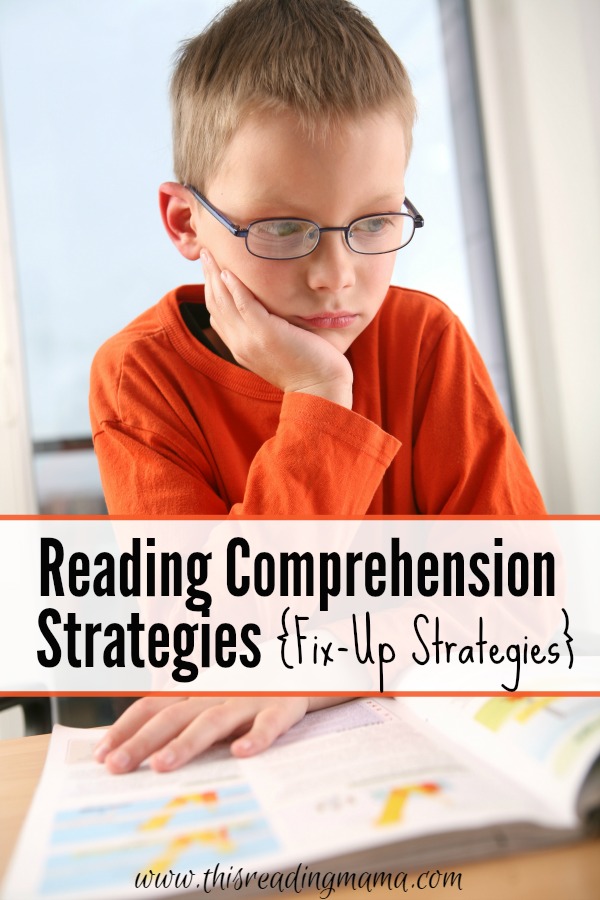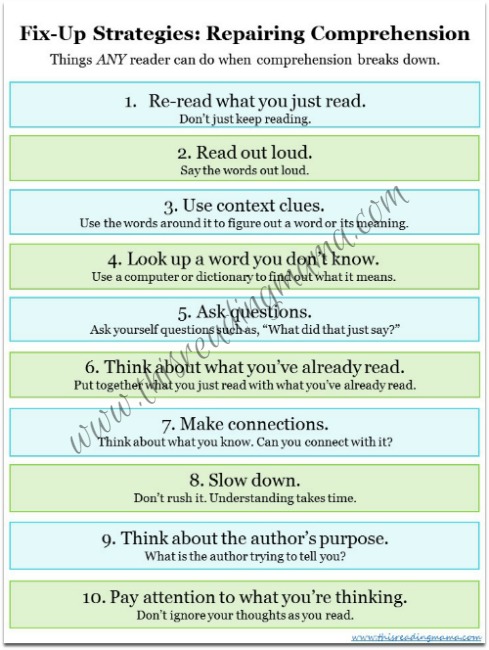Strategies to Help a 5th Grader With Reading Comprehension
If yous've ever taught a struggling reader alongside a confident reader, you'll notice some stark differences. While both come to words they don't know, the confident reader is more than likely to attempt unlike reading strategies to effigy out the unknown words. Often times, the struggling reader freezes considering he either doesn't accept the strategies or isn't sure which one(s) to use.
Both kinds of readers also have times when the text just doesn't make sense to them. The confident reader is more than likely to use reading comprehension strategies {or fix-upwardly strategies} while the struggling reader either freezes or isn't sure what comprehension strategies to use.

*This mail contains affiliate links.
1 of the bug for struggling readers is they call back that confident or "proficient" readers don't need to apply these reading comprehension strategies {or fix-up strategies}. Only "bad" readers do. Many times they avoid using them because they experience that using them makes them a "bad" reader (or confirms the fact that they are a "bad" reader). "Good readers", in their listen, don't need to use these strategies because "proficient readers" become information technology correct the get-go time. What readers, especially struggling readers, need to see is that adept readers Practice use fix-up strategies!
What are Reading Comprehension Strategies {Set-Up Strategies}?
Have you always read a passage of text and then realized that while you read every discussion, yous tin can't remember a affair? Maybe you lot misread a word only to find out that the sentence you lot just read didn't make a lick of sense. Or perhaps you came across a give-and-take that you had never heard of before. Chances are you used a prepare-up strategy to help y'all make sense of what you lot read. And that's just what fix-up strategies are. They are reading comprehension strategies that assist you "fix up" your understanding (or misunderstandings) every bit you lot read.
10 Fix-Upwardly Reading Comprehension Strategies
1. Re-read. This is one that nigh readers want to skip. "I'll but go on on reading and she'll never notice I misread that," is what a lot of young readers tend to retrieve. Just re-reading helps readers to clarify their thoughts or go back and re-read something that was misread to find the mistake and prepare information technology.
2. Read out loud. Sometimes information technology just helps to hear yourself read out loud. {I personally practise this when we buy a new game board and I have no idea what the directions are telling me.}
three. Use context clues.What clues does the moving-picture show or sentence(s) surrounding the unknown word offer to help you comprehend? Using context clues tin can help readers figure out how to decode words or figure out a words meaning. As readers accelerate, context clues are typically used to figure out how to read words with more than i pronunciation (such as tear or alive) or words with more than one pregnant (such equally run).
4. Look up a give-and-take you don't know. When using context clues nonetheless doesn't aid, readers may need to expect up the meaning of a word. Words can almost certainly be researched on the figurer, tablets, or phones {supervised for kids}, but we don't want to neglect the dictionary. Most readers do non even know how to use a dictionary. Yes, they might be able to look up the give-and-take they need, but they also need to be need to exist taught how the dictionary lists words by base or root so they can notice the definition quickly.
5. Inquire questions. Questions such as, "Where did my thinking get off?", "Does that brand sense?", "What will happen next?" or "What does that word mean?" are quite helpful to the reader.
6. Call up nearly what you lot've already read. Is what you're now reading fit into the story or purpose of the text?
vii. Make connections. Making connections is at the heart of reading comprehension strategies. Readers desire to be able to utilise what they know so information technology can be connected with what they're reading. When text doesn't make sense, skillful readers may try to make a meaningful connection to brand sense of information technology.
8. Slow down. This another one struggling readers tend to avert. They want to zoom right past so that no one can describe attention to their mistake. They may also want to but get the reading assignment "done". Slowing down is the final thing they desire to do.
9. Think well-nigh the author'southward purpose. The author'south purpose for writing dictates the structure they use, the vocabulary they use, and the text features they employ. While a reader may be reading the notice out more information about a subject, he may discover quickly that the author's purpose isn't to share all the arguments, but to persuade the reader merely to one side.
x. Pay attention to your own thinking {metacognition}. This may the umbrella that covers all the other prepare-up strategies: Proficient readers pay attention to and mind the warnings of the thoughts in their caput. When a prediction they make does not pan out as they read, they stop and make new predictions. We must teach readers to think about and be aware of the thoughts in their caput as they read.

Download this Complimentary printable pack. Information technology contains book marks and a 1-page poster (in color and black/white) that you lot tin can employ to help your readers know that fix-up strategies are a must for every reader!
Modeling Fix-Upwards Reading Comprehension Strategies
Struggling and reluctant readers demand to Run across that proficient readers use these strategies. One SIMPLE way to do this is to model them as nosotros read aloud to kids. We tend to use these naturally without bringing much attention to them. So much so, that a struggling reader may non even realize we're using them. Instead, we need to slow downwards and betoken them out and so our kids can see how we utilize them.
For example, as I was reading The Indian in the Closet merely recently to my 3rd grader, I came to the word lorry. I honestly had no idea what it meant {UK readers: insert laugh here}. I stopped and said out loud,
- "I wonder what a lorry is?" {strategy #5}
- "I'thou going to re-read what I merely read to encounter if I can figure out what lorry means because I've never heard it before." {strategy #1}
- Upon re-reading a piffling slower this time {strategy #one and #eight}, I was able to say, "Well, I recollect information technology's some kind of vehicle because the discussion Matchbox is in front of it and we take enough of Matchbox vehicles. But I'thou still not sure what lorry ways. I'grand going to continue reading a scrap more and see if there are any clues." I finished the paragraph and said, "Nope. I still am not sure of the verbal pregnant of lorry." {strategy #3 and #7}
- I was about to selection up my phone and say, "What does lorry hateful?" {strategy #4} when my husband, who is a marketing manager in the trucking manufacture, popped his head into the room and said, "Truck. It means truck."
- In one case I had that info, I said, "Okay. Permit me re-read that part again and think 'truck' when I read lorry this time." {strategy #1}
While I don't do this with every mistake I make at the time it happens during a read aloud {because this could totally interfere with the comprehension and momentum of a read aloud}, I'll often revisit those places where I re-read or slowed down or listened to my thoughts of "this doesn't make sense" after nosotros've read the volume/chapter simply to show readers that I STILL use these fix-upwardly reading comprehension strategies. YES, fifty-fifty "skilful" readers do!
More Ideas for Readers:
- Comprehension Strategies {Reading Equals Thinking}
- Asking Questions to Bank check Comprehension
- Using Context to Teach Vocabulary {Gratuitous printable}
- 5 Days of Teaching Text Structure {with LOADS of FREE graphic organizers}
- v Simple Means to Improve Reading Comprehension
Follow This Reading Mama's lath Comprehension Strategies on Pinterest.
Follow This Reading Mama'southward lath Struggling Readers on Pinterest.
~Becky
Strategies to Help a 5th Grader With Reading Comprehension
Source: https://thisreadingmama.com/reading-comprehension-strategies/
0 Response to "Strategies to Help a 5th Grader With Reading Comprehension"
Post a Comment